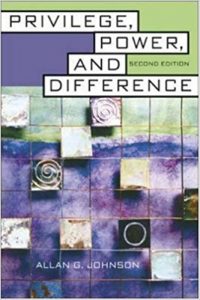Privilege, Power, and Difference, written by Allen Johnson, explores the role of privilege in greater systems of oppression as a means to open one’s eyes to their role in eradicating these oppressive systems. Identifying as a sociologist, Allen Johnson situates himself first in his understanding of his own identity. As a “white, straight, male, non-disabled, middle-class”(xi) person, Johnson is situated in various privileged identities and uses that to examine the ways in which his “good fortune” is related to others’ “misfortune”.
written by Allen Johnson, explores the role of privilege in greater systems of oppression as a means to open one’s eyes to their role in eradicating these oppressive systems. Identifying as a sociologist, Allen Johnson situates himself first in his understanding of his own identity. As a “white, straight, male, non-disabled, middle-class”(xi) person, Johnson is situated in various privileged identities and uses that to examine the ways in which his “good fortune” is related to others’ “misfortune”.
In this discussion is an examination of difference. Drawing from black feminist Audre Lorde and writer James Baldwin, Johnson relates that difference has been conflated to mean inclusion and exclusion. Rather, these terms of exclusion and inclusion were made arbitrarily to create a privilege people and a oppressed people. To understand his privilege and the privilege of others likes him, Johnson reiterates that being or having privilege doesn’t not mean there is space outside that privilege. One cannot escape their privilege and therefore be exempt from its consequences. Rather, they are always implicated in their privilege and what is means for others, and therefore in order to change the privilege one is given, one must change the privileges others are not given. Continuing in his argument, Johnson continues to complicate understandings of privilege and difference by drawing the connections to our capitalist economy. Capitalism has had egregious affects on societal order and politics as it is another form of institutional inequality. One consequence of this capitalist system is individualistic thinking, which leads people to believe their problems are not connected to greater social faults but rather due to their own choices and actions. Johnson makes a point to address this individualistic thinking as problematic as it allows people to blame disenfranchised people for their own disenfranchisement. This type of blaming does not allow one to see that individual problems are rather often symptoms of greater social issues. Being able to appreciate this is integral to address systems of privilege and dominance. Throughout the book, Johnson offers tools that allow us to the work of “undoing” the hundreds of years of institutionalizing “patterns of exclusion, rejection, privilege, harassment, discrimination, and violence that are everywhere in this country” (125). Through dismantling widespread myths such as “ It’s always been this way, and it always will” and offering solutions such as “learn to listen”, Johnson concludes with tangible actions every person is capable of doing to work towards a more just society. He points out that as each of us are complicit in our society, we each cannot be exempt from the work it will take to create a better society for us all.
Johnson’s books moves beyond introduction to the world of feminism, critical race theory, and sociology. He offers his perspective as a jumping off point for understanding the ways in which systems of oppression, domination, and privilege work to create the unjust world we live in today. He defines each important term to make it understandable and accessible, so that this information does not remain in the academic world but can rather be understood by any reader. As a white man situated in many places of privilege, Johnson does have some blindsides due to his position(s) in society, but critically examines himself which is an important tenant of this book and the problems this book aims to address.
